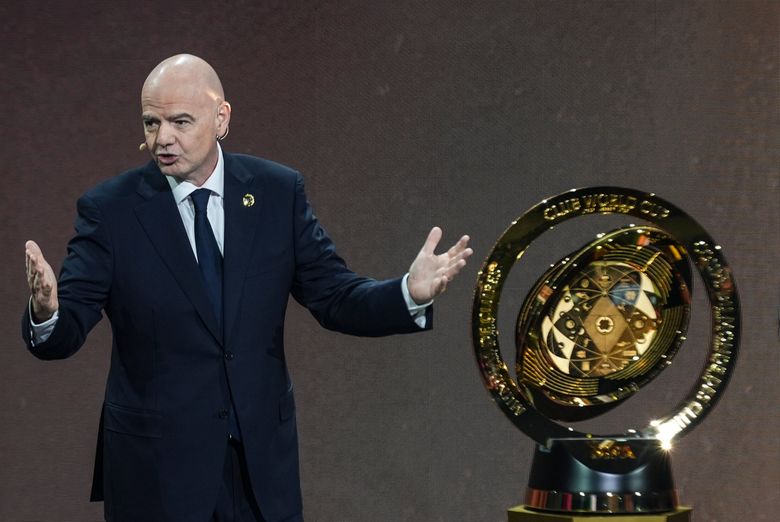
Here's ads banner inside a post
The world of soccer is no stranger to high-stakes drama, but the latest controversy rocking the sport isn’t happening on the field. Instead, it’s unfolding in boardrooms and press conferences as some of the sport’s most iconic players and coaches openly criticize FIFA’s decision to expand its marquee tournaments. The governing body’s plans to enlarge the men’s World Cup and other competitions have sparked a revolt, with top players voicing concerns about the impact on their careers, health, and the quality of the game itself.
The Expansion Debate: More Games, More Problems?
FIFA’s ambitious plans to expand the World Cup from 32 teams to 48 starting in 2026 have been met with mixed reactions. While the expansion promises greater inclusivity for smaller nations and increased revenue for the sport, it also significantly increases the workload for players. For the world’s top athletes, many of whom already endure grueling schedules packed with club competitions, international matches, and commercial commitments, the prospect of playing even more games has become a flashpoint.
“We’re not machines,” said Kevin De Bruyne, the Belgian midfield maestro and one of the sport’s most vocal critics of the expansion. “Adding more games to an already packed calendar will only lead to more injuries and shorter careers. It’s not sustainable.”
Here's ads banner inside a post

De Bruyne’s concerns are shared by many. The soccer calendar is already dense, with elite players participating in domestic leagues, continental tournaments like the UEFA Champions League, and international competitions such as the Nations League and the World Cup. The additional games from FIFA’s expansion plans could push players to their physical and mental breaking points.
A Growing Chorus of Dissent
The backlash isn’t limited to players. High-profile coaches, including Liverpool’s Jürgen Klopp and Manchester City’s Pep Guardiola, have also expressed their dissatisfaction with the direction FIFA is taking. Klopp, known for his passionate advocacy for player welfare, has been particularly critical.
Here's ads banner inside a post
“The people making these decisions don’t have to run on the pitch every three days,” Klopp said in a recent press conference. “They’re not the ones dealing with injuries or burnout. It’s the players who pay the price.”
Guardiola echoed similar sentiments, highlighting the diminishing quality of games when players are overworked. “You can’t expect top performances when players are exhausted,” he remarked. “More doesn’t always mean better.”
Player Welfare on the Line
The physical toll on players has become increasingly evident in recent years. The 2022 World Cup in Qatar, held in November and December to avoid extreme summer temperatures, caused massive disruptions to the club season and forced players into an unprecedentedly tight schedule. Many stars, including Neymar and Paul Pogba, suffered injuries that sidelined them for critical games.

Medical experts warn that an expanded tournament schedule could exacerbate these issues. Studies have shown that playing matches with little recovery time increases the risk of muscular injuries and fatigue-related illnesses. Furthermore, the mental strain of constant travel, intense competition, and media scrutiny can lead to burnout and anxiety.
“Player welfare needs to be the priority,” said Dr. Mark Wilson, a sports medicine specialist. “We’re already seeing players retiring earlier than they used to because their bodies can’t handle the strain. Adding more games will only accelerate this trend.”
FIFA’s Justification
Despite the backlash, FIFA President Gianni Infantino has defended the expansion as a move that benefits the global soccer community.
“The World Cup belongs to everyone, not just a handful of countries,” Infantino stated. “By increasing the number of teams, we’re giving more nations the opportunity to compete on the world’s biggest stage. It’s about growing the game and bringing it to new audiences.”
Infantino’s argument holds weight for smaller nations that have historically struggled to qualify for the tournament. The expanded format offers them a better chance to showcase their talent and inspire future generations. It also promises financial windfalls for FIFA, which could reinvest the proceeds into developing soccer infrastructure in underrepresented regions.
The Fans’ Perspective
Among fans, opinions are divided. Some welcome the expansion as a chance to see more diverse matchups and underdog stories. Others, however, fear that the added games will dilute the quality of the tournament and lead to player fatigue.
“The World Cup is special because it’s the pinnacle of soccer,” said Marcus Taylor, a lifelong fan from England. “If you start adding more teams and games, it risks becoming less of an elite competition and more of a commercial circus.”
Social media platforms have become battlegrounds for the debate, with hashtags like #ProtectThePlayers and #ExpandTheGame trending as fans weigh in on the controversy.
What’s Next?
As the 2026 World Cup approaches, the tension between FIFA and soccer’s top players shows no signs of easing. Player unions and advocacy groups are calling for meaningful dialogue with FIFA to address their concerns. Some have even suggested introducing mandatory rest periods or reducing the number of club games to offset the increased international workload.
“We need to find a balance,” said FIFPro, the global players’ union, in a recent statement. “Expanding the game should not come at the expense of the very people who make it possible: the players.”
Whether FIFA will heed these calls remains uncertain. However, one thing is clear: the voices of the players are growing louder, and their concerns cannot be ignored. As the debate unfolds, it’s a reminder that while soccer may be a global passion, its future depends on protecting the stars who bring it to life.

